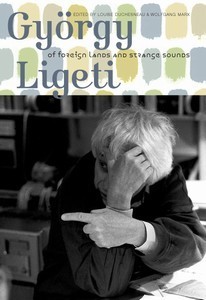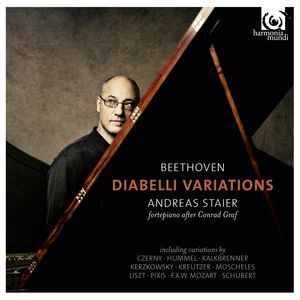Alex Ross's Blog, page 192
May 10, 2012
CD of the Week: Staier's Diabelli Variations
Variations 20 through 23 of Beethoven's Diabelli Variations; Andreas Staier, fortepiano (Harmonia Mundi 902091).
If you're wondering what on earth is going on, see Ivan Hewett's review for more information.
Miscellany: Waiting for Louise, etc.
Alan Rusbridger, one of the world's most influential newspaper editors, devotes his time to an extensive interview with the composer George Benjamin.... The beloved blog Proper Discord has returned, now identifying itself as the work of a Mr. Doe.... The new company Opera Moderne, which won a positive review from Zachary Woolfe in the fall, had caused some excitement by announcing a production of Gustave Charpentier's magnificent vériste drama Louise, which, I believe, has been missing from New York stages since Beverly Sills sang it at City Opera in the 1976-77 season. That plan has been put off, alas, but the company will present Turn of the Screw on May 26.... It's still hard to believe that Milton Babbitt is no longer with us — I hear him soliloquizing in a corner of my mind. A Babbitt Retrospective at CUNY on May 25 features a rare performance of the Composition for Four Instruments, a pointillist masterpiece never issued on CD but available on MP3.... The Queens New Music Festival runs through May 13: Todd Reynolds, TACTUS, Parthenia, and the Lost Dog New Music Ensemble cast a wide stylistic net.... ACME has a two-day gig at the Kitchen this weekend, featuring new works by Mick Barr and William Brittelle.... And there's Look and Listen, with a Cage tribute by Derek Bermel and much else.... The River to River Festival has much contemporary fare on its summer 2012 schedule: the Philip Glass Ensemble, Paola Prestini, Missy Mazzoli and Victoire, and an extension of Judd Greenstein's Ecstatic franchise. The fest begins with the Bang on a Can Marathon, on June 17, and ends with an Alarm Will Sound presentation of Cage's Song Books, on July 15.
May 9, 2012
The man who didn't love the Beatles
 Like a few million others, I'm a fan of the TV series Mad Men, set in and around a Madison Avenue advertising firm in the nineteen-sixties. The show's use of music is both pointed and subtle, highlighting personality traits rather than generating clichéd moods. A few episodes ago, there was a Beethoven moment, in which Pete Campbell seemed aroused more by the power of his hi-fi system than by the music itself. Last Sunday, the Beatles entered the picture: at the end of the episode, Don Draper, the outwardly debonair and inwardly troubled star of the firm, listened to "Tomorrow Never Knows," from Revolver, at the suggestion of Megan, his hip, young wife. He then turned it off, seemingly unimpressed. Mad Men evidently paid $250000 for the rights to the song; permission is very rarely granted for the use of original Beatles recordings in television and film.
Like a few million others, I'm a fan of the TV series Mad Men, set in and around a Madison Avenue advertising firm in the nineteen-sixties. The show's use of music is both pointed and subtle, highlighting personality traits rather than generating clichéd moods. A few episodes ago, there was a Beethoven moment, in which Pete Campbell seemed aroused more by the power of his hi-fi system than by the music itself. Last Sunday, the Beatles entered the picture: at the end of the episode, Don Draper, the outwardly debonair and inwardly troubled star of the firm, listened to "Tomorrow Never Knows," from Revolver, at the suggestion of Megan, his hip, young wife. He then turned it off, seemingly unimpressed. Mad Men evidently paid $250000 for the rights to the song; permission is very rarely granted for the use of original Beatles recordings in television and film.
The scene has stirred much discussion, particularly among pop critics. Ann Powers, one of my favorite voices in modern music writing, has a blog post questioning the premise: she argues that an ad man of Don Draper's background and reputation would have "loved the Beatles from the minute they hit Ed Sullivan," and would hardly have been alienated by the mild avant-gardism of a song like "Tomorrow Never Knows." (I wrote about Xenakis, Stockhausen, Sibelius, and the Beatles here.) I have to disagree with Ann: I found the scene entirely believable. Yes, you'd expect Don to dig the Beatles, but taste is mysterious, personality is mysterious, and the character grows more real by resisting stereotype. Furthermore, I like how the scene resists the master narrative of Pop Conquers All. Matthew Weiner, the creator of the show, made the customary genuflections toward the Beatles in the Times — "they are the band, probably, of the 20th century," etc. — but the scene sends the more complicated message that no music is everywhere beloved. I've read people saying that Don's lack of interest in the Beatles shows him growing old, growing cold, dying inside. But, believe it or not, it's possible to be a fully developed human being and still remain indifferent to the Beatles. Or Beethoven, for that matter. Schopenhauer notwithstanding, music has never been and will never be a universal language. It is too rich for that.
May 8, 2012
Against cheesecake
A magnificent essay by Andrew Ford: "In order to understand music, we must be able to think musically, and this is a talent that most of us can acquire at some level. With physics, you won’t get on with the advanced stuff if you have failed to understand the basics, but with music you can jump in anywhere. If you find the water too chilly, you can always get out and try again later – or try somewhere else. Eventually you are likely to find something that holds your attention and this, in turn, will lead you to another piece of music and another. Most people get this far. The next step is to find yourself listening to music you don’t like or understand, reasoning that with a little persistence on your part the piece in question will begin to reveal its secrets. Surprisingly often, it does. If you’ve come this far, you are, I believe, a musical person, even a musician of sorts, engaging with music at quite a profound level, participating in musical thinking."
Ring dinged
In a piece for the New Yorker culture blog, I survey the aftermath of the Met's new Ring. In the magazine this week I have a Critic's Notebook about the Ives Universe Symphony, to be played by the Nashville Symphony at Carnegie on Saturday.
May 7, 2012
Hamelin on Busoni
When I wrote about Busoni's Piano Concerto in January, I asked Marc-André Hamelin for his thoughts about the piece. I quoted a bit of what he said in my column; on the occasion of Hamelin's performance of the work this Wednesday with the New Jersey Symphony, as part of Spring for Music, here are more of his remarks. He has made an excellent recording of the concerto for Hyperion.
I've lost exact count of the performances I've given of the Busoni so far — it must be somewhere between twenty and twenty-five different venues. My very first one occurred in 1996, at the Lanaudière Festival in Joliette, Québec, with the Montréal Symphony, which was, interestingly, conducted by Jacques Lacombe [who leads the New Jersey on Wednesday]. The following stand out in my mind, in no special order: Suisse Romande, in Geneva, with Fabio Luisi; Sinfonia Lahti, with Osmo Vänskä; Tokyo Philharmonic, with Ryusuke Numajiri (in 2011; incredibly, this was the Japanese première); BBC Philharmonic in Manchester, with Vassily Sinaisky; Dallas Symphony, with Andrew Litton; and, most recently, last September, the Berlin Radio Orchestra under Marek Janowski.
This concerto's had a rocky history, and I think the problem has to do with what one expects from the piece. As a listener, the best attitude one can adopt for this kind of groundbreaking work is to bring to it a completely clean slate; those who are willing to shed any opportunity of comparing this piece with what they might already know are in for a truly transformative experience. Experiencing it while trying to get it to conform to a template of the accepted, traditional concerto form is likely to lead to either disappointment, disorientation, or both; only the first movement can be said to resemble anything like the usual "first movement sonata-allegro mold," and even that's a bit of a stretch. The usual role of the soloist is transformed here, and much more integrated in the orchestral fabric than usual. But if one must compare it with anything, I think that the work is likely to fare a lot better if one listens to it like one would a large-scale symphony (e.g. Mahler); the use of a choir in the last movement will thereby seem more natural, instead of inspiring derision.
The piano part is quite the monster, yes, but thankfully Busoni gives you opportunities to rest in between Everests! It's an especially joyful feeling to be allowed to be almost completely silent during the fifth movement, this after having had your blood pressure raised several points during the Tarantella. Some passages can be slightly redistributed or sometimes even rescored pianistically so that they can be made somewhat more manageable while sounding exactly the same. (To my mind there's a vast difference between "rescoring" and "faking"!) This said, the whole requires a very large sound, and I think it's essential to have a large-sounding piano at your disposal.
However — and needless to say — even a complete mastery of the pianistic problems is meaningless if you remain unaware of the loftiness of Busoni's aims. I've said in print recently that treating something like the Liszt Sonata as a purely virtuosic exercise — something that is all-too-often a reality these days — is a little bit like tearing a page off a Gutenberg bible and using it to wrap carrot peels.
May 5, 2012
Ligeti's Third Quartet

The latest edition of the Paul Sacher Stiftung journal has a fascinating article, by Bianca Ţiplea Temeş, on György Ligeti's sketches for his projected third and fourth string quartets. (Ligeti's papers and manuscripts are, of course, part of the huge Sacher collection, in Basel.) She writes:
At first, String Quartet No. 3 was meant to be written in a single section ("One long movement with many episodes"), recalling the form of Métamorphoses nocturnes. It then underwent various shapes as a piece in six or three movements, with the duration of each movement precisely specified (12' + 3' + 6' = 21'). The musical language was also very well outlined in words: "Entirely microtonal," "Microtonal harmonics," "It disintegrates through hyperchromaticism typical of Gesualdo," augmented with detailed information on which strings the instrumentalist was meant to play. Descriptions combining visual and acoustic elements of different musical fragments are very relevant: "Gradually it evolves higher and higher (maybe the cello plays in a low register, on the C string, as a BORDUN), the others disappear irritated in the high register through high harmonics, as a lost plane." For each of these characteristics, Ligeti sums up a rich array of extra-European musical influences of a wide geographical spread, stringing together rhythmic and melodic ideas from Burma, Uganda, Great Zimbabwe, Java-Bali, Cameroon, etc. Moreover, he crosses the frontier of art music by integrating references from the fine arts into his verbal sketches: "In Escher's footsteps," "Pinturas negras," "Alhambra ornaments," all articulating the image of a complex personality of twentieth-century culture and leaving unanswered for posterity the question of what String Quartets Nos. 3 and 4 might have sounded like.
That's for sure! Incidentally, I've been meaning for months to mention a significant addition to the Ligeti bibliography: Louise Duchesneau and Wolfgang Marx's György Ligeti: Of Foreign Lands and Strange Sounds, a beautifully edited and illustrated anthology of essays on Ligeti's myriad-minded life and work. Duchesneau served for many years as Ligeti's assistant and was ever helpful to those who approached the master with questions. The new book features Marx on Le Grand Macabre, Simha Arom on Ligeti and African music, Jonathan Bernard and Richard Steinitz on Ligeti's sketches, Wolfgang-Andreas Schultz and Manfred Stahnke on Ligeti's classes, Ciarán Crilly on Ligeti and Kubrick. The accounts of Ligeti as teacher are particularly fascinating, giving us a picture of the man's resistance to any known stylistic party line: he extols Vivier and Grisey, comes round to Shostakovich and Ferneyhough, rejects Nono and Lachenmann. (Ligeti apparently never forgave Nono for saying, after the suppression of the 1956 uprising, "And Hungary is also liberated now.") Steinitz's essay — a crucial epilogue to his great Ligeti book — again demonstrates Ligeti's intensely verbal, allusive approach to the planning of his works: one note about the Horn Trio makes reference to Charlie Parker, Oscar Peterson, and Supertramp. (See the Benoît Delbecq interview for more on Ligeti and jazz.) Duchesneau herself surveys Ligeti's record collection, which contained vast quantities of non-Western music. She, too, notes Ligeti's fondness for Supertramp, reporting that the group's records Crime of the Century and Breakfast in America are mentioned alongside Balinese kecak music and the rumba band Los Papines in sketches for Ligeti's might-have-been masterwork, Alice in Wonderland. Ligeti, we miss you very much...
May 4, 2012
For Adam Yauch
Adam Yauch, of the Beastie Boys, died today, at forty-seven. Sasha Frere-Jones has a lovely and personal tribute to him on the New Yorker website. Oddly, I was at the Reading Festival show that Sasha mentions. I was in London working on an article and spent a free day out at Reading. While sitting on the lawn, I chatted for a while with a guy who had a band called Velour; in the following years, I kept waiting for Velour to make it big, so I could say I knew them when, but they did not. In any case, the Beastie Boys were about as much pure, vital fun as any pop act I've seen. The Prodigy, who preceded them, were the opposite. A vicious atmosphere developed during their set, and a bloody fight broke out near me, even as a bunch of German kids sang along to the Prodigy's misogynistic anthem with the words “snap my picture.” The moment the Beasties took the stage, it all turned to rambunctious bliss.
Alec Baldwin on the arts
Non-American readers may not realize how rare it is for Hollywood celebrities to show appreciation for classical music. If they do listen, they tend to hide it — for fear, I guess, of being labeled elitists or sissies or what have you. Alec Baldwin shows no such fear. He has assumed the role of chief celebrity spokesperson for the classical tradition, most prominently as the announcer of the New York Philharmonic broadcasts. He routinely names favorite composers, recordings, and performances on his lively Twitter feed, and often mentions the Philharmonic during talk-show appearances. At a time when celebrity has a creepy, almost dictatorial power, Baldwin has won the gratitude of a culture starved for media attention.
Above, Baldwin delivers the Nancy Hanks Lecture on Arts and Public Policy at the Kennedy Center; it starts forty-five minutes in. For a stretch at the beginning, he talks about the happenstance ways in which he stumbled onto classical music and other cultural pursuits while growing up on Long Island: the art design of Babes in Toyland and The Wizard of Oz, the blend of music and dance in West Side Story, the Beethoven that played at the end of the Huntley-Brinkley Report. It's telling to see one of NBC's biggest stars drawing a pointed contrast between the past and present of Studio 8H. He goes on to say that working with the Philharmonic has been "without question the greatest creative pleasure I have ever had," and declares that government support of the arts should foster "freedom from the commercial considerations that so often compromise and eventually suffocate real art." (There's a passing swipe at the Corporation for Public Broadcasting, which has drifted far from its original mission.) In a wistful moment toward the end, he says that if he were president he would give a billion dollars each to the National Endowment for the Arts and the National Endowment for the Humanities.
Nancy Hanks, incidentally, was the extraordinarily effective chairperson of the NEA from 1969 to 1977. During her term, the budget of the NEA grew from $11 million to $114 million. Yes, Richard Nixon appointed her.
May 3, 2012
Miscellany: Gertrude's Paris, etc.
The indefatigable Ethan Iverson gives a thorough, candid, and impassioned assessment of the recorded output of the late Peter Lieberson. I love the (first) Piano Concerto from start to finish—its neglect is baffling. I memorialized my former teacher here.... The Little Opera Theatre of New York is giving a double bill of chamber operas by Gustav Holst: The Wandering Scholar and the Indian-inflected Savitri, one of the more original music-theater works of its time.... The Eclipse Quartet jets in from L.A. to give two shows at Roulette on May 21 and 22: repertory includes the Ruth Crawford Seeger quartet, a Roscoe Mitchell premiere, and the Feldman Piano and String Quartet (with Vicki Ray).... The formidable Köln outfit Ensemble musikFabrik descends on EMPAC, in Troy NY, on May 13, with a program of Richard Barrett, Claude Vivier, and Cage (his Concert for Piano and Orchestra). They are overdue for an NYC appearance.... Cage's How to Get Started is the focus of a daylong Symphony Space event tomorrow, with PEN authors and randomly selected audience members participating. The same venue hosts a Gertrude's Paris marathon the following day — marvelous literary and musical programming centered on the figure of Miss Stein.... Spring for Music is almost here. A reminder that all tickets are at most $25; you can buy a six-concert pass for $100.... If the Busoni Piano Concerto on May 9 isn't your bag — I revealed my weakness for the piece in a January column — you might check out a simultaneous Ekmeles / AMP New Music event at Columbia's Italian Academy, presenting several Scelsi pieces and a new Gregory Cornelius work alongside the American premiere of Nono's Quando stanno morendo, diario polacco no. 2.... A couple of early-music picks: Pomerium's fortieth-anniversary concert, in the Music Before 1800 series on May 6; and a Sonnambula Spanish-Renaissance program on May 16.
Alex Ross's Blog
- Alex Ross's profile
- 425 followers






